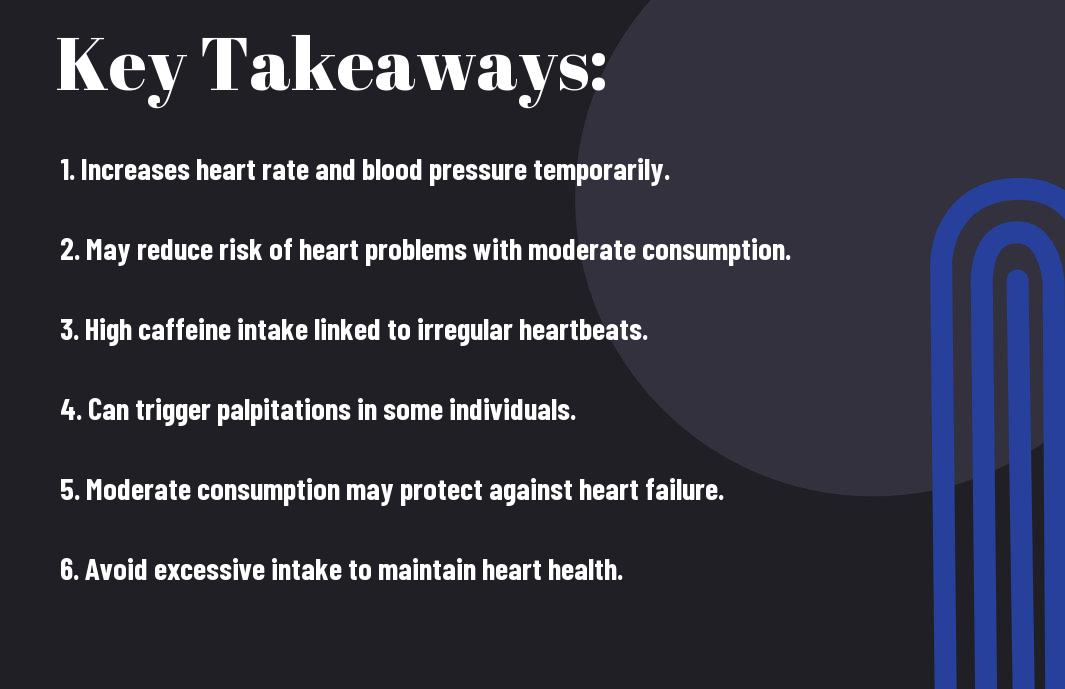You may have never thought about it before, but the impact of that morning cup of coffee on your heart is more significant than you realize. In this informative piece, we unfold the intricate relationship between coffee consumption and its effects on your cardiovascular health. Delving into the latest research findings and expert opinions, we will shed light on the various ways in which your beloved brew can influence your heart’s well-being. So grab a cup of coffee and join us on this fascinating exploration of the heart-caffeine connection.
Key Takeaways:
- Caffeine consumption: Coffee’s impact on the heart is primarily due to its caffeine content.
- Heart rate: Caffeine can lead to a temporary increase in heart rate after consumption.
- Blood pressure: Coffee can cause a temporary spike in blood pressure, especially in individuals who are sensitive to caffeine.
- Regular consumption: Moderate coffee consumption is generally considered safe for most people and may even have some health benefits for the heart.
- Individual sensitivity: It’s important for individuals to be mindful of their own tolerance to caffeine and adjust their coffee intake accordingly to prevent any negative effects on the heart.
The Caffeine Connection
Your daily cup of coffee could have a significant impact on your heart health, thanks to the caffeine it contains. Caffeine is a stimulant that works by blocking the action of a neurotransmitter called adenosine, which helps keep you awake and alert. This action leads to increased neuron firing in the brain and the release of other neurotransmitters like dopamine and norepinephrine, ultimately affecting your heart rate and blood pressure.
How Caffeine Affects Heart Rate
Caffeine can cause a temporary increase in heart rate by stimulating the release of adrenaline, the ‘fight or flight’ hormone. This can make your heart beat faster than usual, especially right after consuming caffeine. While for most people this increase is harmless and temporary, individuals with certain heart conditions may experience palpitations or irregular heartbeats, so moderation is key.
The Impact on Blood Pressure
Connection between caffeine consumption and blood pressure is a complex one. While some studies suggest that habitual coffee drinkers may develop a tolerance to the blood pressure-raising effects of caffeine, others find that caffeine can acutely raise blood pressure, especially in individuals who are not regular coffee drinkers. For those with high blood pressure, it’s crucial to monitor caffeine intake and consider switching to decaffeinated options to avoid any potential spikes in blood pressure levels.
Understanding the relationship between caffeine and heart health is necessary for making informed choices about your daily coffee habit. It’s always recommended to consult with your healthcare provider to determine what’s best for your individual heart health needs.

Cardiovascular Risks
Increased Heart Attack Risk
One potential risk associated with high coffee consumption is an increased likelihood of experiencing a heart attack. While moderate coffee consumption may have some cardiovascular benefits, such as improved blood vessel function, excessive intake can have the opposite effect. Studies have shown that consuming large amounts of coffee can raise blood pressure and increase the risk of heart attacks, especially in individuals with underlying heart conditions.
Stroke and Coffee Consumption
An important consideration when it comes to coffee consumption and cardiovascular health is the risk of stroke. While some studies suggest that moderate coffee consumption may be associated with a lower risk of stroke, excessive intake can lead to negative consequences. It is imperative to be mindful of your overall caffeine intake, as too much coffee can contribute to high blood pressure and atrial fibrillation, both of which are risk factors for stroke.
To reduce the risk of stroke associated with coffee consumption, it is advisable to limit your daily intake and monitor how your body responds to caffeine. Individuals with existing heart conditions or hypertension should be especially cautious and consult with a healthcare provider about their coffee consumption habits.
This highlights the importance of moderation when it comes to coffee consumption and its impact on heart health. It is crucial to be mindful of your overall caffeine intake and pay attention to how your body reacts to coffee. By being aware of the potential risks and benefits, you can make informed decisions about your coffee consumption to promote better heart health in the long run.
The Good News
Once again, it’s time to celebrate your daily coffee habit – especially when it comes to your heart health. Despite some concerns about the potential adverse effects of caffeine on the heart, there are actually some positive aspects of coffee consumption that can benefit cardiovascular health.
Antioxidants and Heart Health
To start with, coffee is loaded with antioxidants, which are compounds that help protect your cells from damage. Studies have shown that these antioxidants in coffee may help reduce inflammation and improve blood vessel function, ultimately promoting heart health.
Coffee’s Anti-Inflammatory Effects
Any coffee lover will be pleased to know that their favorite beverage has anti-inflammatory properties. Chronic inflammation is a significant risk factor for heart disease, and research suggests that coffee can help lower markers of inflammation in the body.
Understanding the anti-inflammatory effects of coffee can help shed light on how it can potentially lower the risk of developing heart disease. By reducing inflammation, coffee may help protect the heart and reduce the chances of cardiovascular issues in the long run.

Individual Variations
For some individuals, the effects of coffee on the heart can vary based on several factors. Genetic makeup plays a significant role in how sensitive a person is to caffeine. Some people have genetic factors that make them more sensitive to the stimulating effects of caffeine, while others may metabolize it quickly, leading to less impact on their heart. It is imperative to consider these individual differences when assessing how coffee affects heart health.
Genetic Factors and Caffeine Sensitivity
- Genetic makeup influences caffeine sensitivity
- Some individuals metabolize caffeine differently
Any underlying genetic variations can impact how a person’s heart responds to coffee consumption. Understanding these genetic factors can help individuals make informed choices about their caffeine intake and its potential effects on their heart health.
Age and Heart Sensitivity to Coffee
Factors such as age can also influence how coffee affects the heart. As people age, their sensitivity to caffeine may change. Older adults may experience stronger effects from caffeine, including increased heart rate and blood pressure, compared to younger individuals.
It is imperative for older adults to monitor their caffeine intake and pay attention to how coffee affects their heart health. Consulting with a healthcare provider can help determine the appropriate amount of coffee consumption based on individual sensitivity and overall health status.

Lifestyle Factors
Many lifestyle factors can influence how coffee affects your heart. It’s vital to consider aspects such as exercise habits and diet when examining the impact of coffee on cardiovascular health. Understanding how these factors interact with your coffee consumption can provide valuable insights into maintaining a healthy heart.
- Exercise: Coffees’ impact on heart rate can vary depending on your exercise routine. Regular physical activity can help mitigate any potential increases in heart rate caused by caffeine consumption. Research suggests that moderate to high-intensity exercise may counteract the effects of caffeine on heart rate. For more information on how caffeine affects the cardiovascular system, you can refer to this source.
Exercise and Coffee’s Impact on Heart Rate
Many lifestyle factors can influence how coffee affects your heart. It’s vital to consider aspects such as exercise habits and diet when examining the impact of coffee on cardiovascular health. Understanding how these factors interact with your coffee consumption can provide valuable insights into maintaining a healthy heart.
Diet and Coffee’s Effects on Blood Pressure
One crucial aspect to consider is how your diet may affect the way coffee impacts your blood pressure. Certain dietary choices, such as consuming high levels of sodium or saturated fats, can exacerbate the potential blood pressure-raising effects of caffeine. Maintaining a balanced and healthy diet rich in fruits, vegetables, and whole grains can help mitigate any adverse effects of coffee on blood pressure.
A balanced diet plays a significant role in how coffee affects your heart. By making conscious choices about what you eat, you can support your cardiovascular health and potentially lessen any negative impacts that coffee consumption may have on your blood pressure. It’s vital to pay attention to your overall dietary habits to ensure that you are promoting a healthy heart.

Managing Coffee Consumption
Unlike other beverages, coffee consumption can have a significant impact on your heart health. Managing your coffee consumption is crucial to maintaining a healthy heart.
Healthy Coffee Habits
Coffee can be enjoyed in a healthy way that benefits your heart. Opt for black coffee or add a splash of almond milk instead of cream and sugar. Limit your intake to no more than 3-4 cups a day to avoid excessive caffeine consumption.
Avoiding Excessive Caffeine Intake
Coffee can elevate your heart rate and blood pressure if consumed excessively. It’s important to be mindful of your caffeine intake and avoid excessive consumption, which can potentially lead to heart palpitations and increased stress on your cardiovascular system.
Habits such as switching to decaf in the afternoon, choosing herbal teas, or opting for water instead of another cup of coffee can help you reduce your overall caffeine intake and support a healthier heart.
Summing up
Conclusively, coffee can have both positive and negative effects on the heart depending on individual factors such as genetics, consumption habits, and overall health. While moderate coffee consumption has been linked to potential benefits like reduced risk of heart disease, excessive intake can lead to negative outcomes such as increased heart rate and blood pressure. It is important for individuals to be mindful of their caffeine consumption and listen to their bodies to maintain a healthy heart.
FAQ
Q: What is the relationship between coffee consumption and heart health?
A: Studies have shown that moderate coffee consumption may have a beneficial effect on heart health. However, excessive coffee intake can lead to an increased risk of heart problems.
Q: Does caffeine in coffee have any effects on the heart?
A: Caffeine is a stimulant that can temporarily raise blood pressure and heart rate. For most people, moderate caffeine intake is generally safe, but individuals with existing heart conditions should be cautious.
Q: How can one balance the benefits and risks of drinking coffee for heart health?
A: To enjoy the potential benefits of coffee for heart health, it’s important to consume it in moderation and be aware of individual sensitivity to caffeine. Consulting a healthcare provider can help determine a suitable coffee intake level based on individual health status.
What are the origins of coffee








